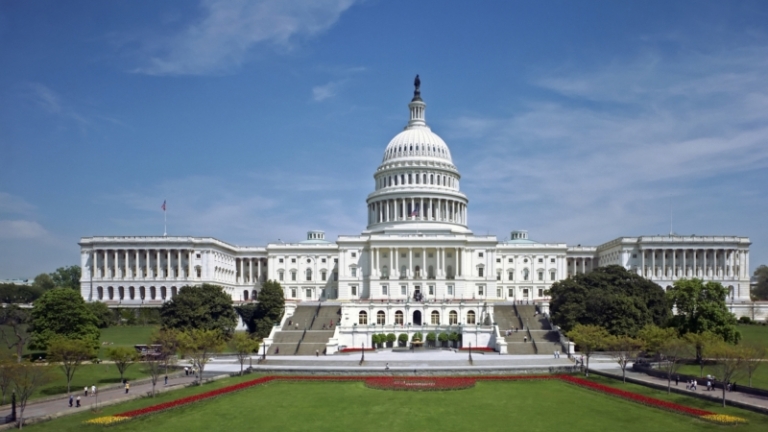
I. Legislative Branch
1) Legislation
House Passes FY26 NDAA. On September 10, the House passed H.R.3838, the Fiscal Year (FY) 2026 National Defense Authorization Act (NDAA), in a 231-196 vote.
The House approved several amendments, including one that would repeal the 1991 and 2002 Authorizations for Use of Military Force in Iraq. Other approved amendments include measures to counter the Boycott, Divestment, and Sanctions movement against Israel, enhance US-Israel defense cooperation, and counter Iran.
House Committee Releases Department of State Reform Legislation. On September 11, Rep. Brian Mast (R-FL) introduced H.R.5300, the Department of State Policy Provisions Act. The bill includes a provision (Sec. 226) which would authorize the Secretary of State to revoke the passport of any individual charged with supporting a foreign terrorist organization, or whom the Secretary determines has “knowingly aided, assisted, abetted, or otherwise provided material support to…a foreign terrorist organization.” Additional provisions include:
- 323:American-Hellenic-Israeli Eastern Mediterranean Counterterrorism and Maritime Security Partnership Act, which would create an Eastern Mediterranean Security Cooperation Group composed of members of Congress and administration officials to coordinate with Israel, Greece, and Cyprus to discuss joint security issues.
- 404:Foreign Military Financing program for Jordan.
- 405:Extension of the War Reserve Stockpile for Allies-Israel.
- 609:Report on UN member states’ voting practices, including their votes on Israel-related resolutions opposed by the United States.
- 612:Prohibition on US contributions to the United Nations International Commission of Inquiry on the Occupied Palestinian Territory, including East Jerusalem, and Israel.
2) Personnel and Correspondence
Partisan Reactions Emerge Over Israel’s Attack on Qatar. Following Israel’s September 9 airstrike in Doha, a partisan divide emerged. Republican lawmakers expressed support for the strike, while most Democrats voiced criticism.
Rep. Brian Mast (R-FL), chairman of the House Foreign Affairs Committee (HFAC), defended the strike, saying “any dead Hamas is good,” including those “hiding behind the negotiating table.” Sen. Jim Risch (R-ID), chairman of the Senate Foreign Relations Committee (SFRC), also supported the attack, stating that for any Hamas leader, “it is a dangerous place to be because Israel is going to do something about it.”
Senate Democrats offered a different perspective. Sen. Jack Reed (D-RI), ranking member of the Senate Armed Services Committee, said the Israeli strike on Hamas would undermine efforts to secure the return of hostages and diminish prospects for future peace in the region. Sen. Jeanne Shaheen (D-NH), ranking member of the SFRC, said that “it’s unfortunate that Israel bombed in Doha, one of our allies.” Rep. Gregory Meeks (D-NY), ranking member of HFAC, also criticized the strike.
Democratic Senators Release Report on Israel’s Ethnic Cleansing Plan. In a report released on September 11, Sens. Jeff Merkley (D-OR) and Chris Van Hollen (D-MD) concluded that Israel is carrying out an ethnic cleansing campaign in Gaza in which the United States is “complicit.” The report is based on their August 24-September 1 visit to Israel, the West Bank, the border of Gaza, Jordan, and Egypt. It discusses Israel’s systematic destruction of civilian infrastructure in Gaza and its deliberate obstruction of humanitarian aid, as well as its use of food as a weapon of war.
3) Hearings and Briefings
House Subcommittees Hold Hearings on Antisemitism in Unions and Schools. On September 9, the House Committee on Education and the Workforce’s Subcommittee on Health, Employment, Labor, and Pensions held a hearing titled “Unmasking Union Antisemitism.” The following day, the Subcommittee on Early Childhood, Elementary, and Secondary Education held a hearing on “the spread of antisemitism in K-12 schools.”
Senate Reviews Nominations for US Ambassador to Jordan. On September 11, the SFRC held a confirmation hearing for James Holtsnider to be US ambassador to Jordan. In his opening remarks, Sen. Jim Risch (R-ID) warned of rising anti-Israel sentiment in Jordan, adding that Holtsnider must look out for Americans in Jordan and “work with [his] counterparts to combat extremism and promote stability in the region.”
II. Executive Branch
1) White House
Witkoff and Kushner Meet Israeli Minister to Discuss Gaza. On September 8, prior to Israel’s attack on Hamas negotiators in Doha, President Donald Trump’s son-in-law Jared Kushner joined Special Envoy Steve Witkoff for a meeting in Miami with Israeli Strategic Affairs Minister Ron Dermer to discuss a new US proposal for ending the Gaza war.
Trump Feels “Very Badly” About Location of Israel’s Strike in Doha. On September 9, President Donald Trump told reporters he was “very unhappy about every aspect” of Israel’s attack on Doha. On Truth Social, Trump said that while eliminating Hamas was “a worthy goal,” he felt “very badly” that the attack occurred in the territory of a close US ally and stated that it “does not advance Israel or America’s goals.” Trump claimed he had directed Special Envoy Witkoff to warn Qatari officials in advance, but said that the warning came too late to prevent the strike. He also stated that he had spoken with Emir Tamim bin Hamad Al Thani of Qatar after the incident to assure him that “such a thing will not happen again on their soil.” On September 10, the Wall Street Journal reported that Trump had a tense call with Netanyahu in which he expressed frustration over being blindsided by the strike and called the decision unwise. On September 12, Qatar’s Prime Minister Mohammed bin Abdulrahman Al Thani met with Vice President JD Vance and Secretary of State Marco Rubio at the White House to discuss defense cooperation following the strike and Qatar’s role as a regional mediator. Trump later hosted the prime minister for dinner, joined by Special Envoy Steve Witkoff.
2) Department of State
Huckabee Says Palestinian Recognition Push Stalled Efforts to Release PA Funds. On September 10, US Ambassador to Israel Mike Huckabee stated that growing support for the recognition of a Palestinian state had stalled US efforts to persuade Israel to release funds to the Palestinian Authority (PA). He added that the wave of statehood recognition announcements also prompted more Israeli declarations of sovereignty over the West Bank. When asked about Israeli settlement expansion, Huckabee responded, “Israel has to do what Israel has to do.”
United States, Egypt, Saudi Arabia, and UAE Propose Roadmap for Peace in Sudan.On September 12, the United States, Egypt, Saudi Arabia, and the United Arab Emirates issued a joint statement outlining a roadmap to end the conflict in Sudan. The proposal calls for a three-month humanitarian truce, followed by a permanent ceasefire and a nine-month transitional process leading to civilian-led governance. The statement urged the warring parties to facilitate humanitarian access and to uphold the 2023 Jeddah Declaration on the protection of civilians. The ministers agreed that “an end to external military support is essential to ending the conflict.”
Rubio Visits Israel Following Qatar Strike. On September 13, Secretary Rubio traveled to Israel to discuss Israel’s planned invasion of Gaza City and US efforts to counter recognition of a Palestinian state and to combat cases against Israel at the International Criminal Court and International Court of Justice. Before his departure, Rubio told reporters that while the United States was not happy about Israel’s strike in Qatar, US-Israel relations would remain strong. He added that he would speak with Prime Minister Netanyahu about how the strike could affect the goals of securing the release of hostages held by Hamas, eliminating the group, and ending the war in Gaza. Rubio is also scheduled to visit the United Kingdom this week and will meet with British Foreign Secretary Yvette Cooper to discuss Iran and Gaza.
3) Department of War
AFRICOM Conducts More Strikes in Somalia. On September 9 and 12, US forces conducted airstrikes against al-Shabab in Somalia. On September 10, US forces conducted airstrikes against the so-called Islamic State in Somalia.
Administration Announces Military Assistance Package for Lebanon. On September 10, the newly renamed Department of War approved $14.2 million in funding to support the Lebanese Armed Forces in dismantling weapons caches and military infrastructure of Hezbollah and other non-state actors. The package includes demolition equipment such as shaped charges, detonating cords, blasting caps, time fuses, generators, and transport vehicles.
CENTCOM Commander and Syria Envoy Meet with Syrian President. On September 12, CENTCOM Commander Adm. Brad Cooper and US Ambassador to Turkey and Special Envoy for Syria Thomas Barrack met with Syrian President Ahmed al-Sharaa at the presidential palace in Damascus. The officials discussed efforts to counter the so-called Islamic State and to integrate Syrian armed groups into the government’s military.
4) Department of the Treasury
Treasury Targets Houthi Smuggling and Procurement Networks. On September 11, the Department of the Treasury’s Office of Foreign Assets Control sanctioned 32 individuals and entities and identified four vessels linked to Houthi smuggling, weapons procurement, and fundraising operations. The designations mark Treasury’s largest sanctions action to date against the Houthis.
Treasury Sanctions Sudan’s Finance Minister and Militia over Iran Ties. On September 12, OFAC imposed sanctions on Sudanese Finance Minister Gebreil Ibrahim Mohamed Fediel and the al-Baraa bin Malik Brigade, an Islamist paramilitary organization associated with the former Bashir regime, with the stated purpose of “limit[ing] Islamist influence within Sudan and curtail[ing] Iran’s regional activities.”
III. Judicial Branch
Supreme Court Lets Trump Freeze $4.9 Billion in Foreign Aid. On September 9, Chief Justice John Roberts temporarily halted a lower court ruling requiring the Trump administration to pay out nearly $5 billion in foreign aid appropriated by Congress. Roberts gave the groups suing the administration until September 12 to respond to the government’s request. The funds expire by the end of the fiscal year, September 30, 2025.

